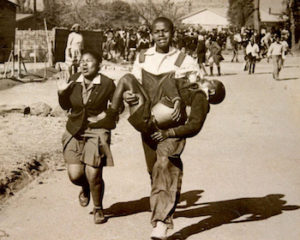
*On this date in 1976, the Soweto uprising occurred. Also known as the Soweto riots, these were three days of demonstrations and protests led by Black youths in South Africa.
Black South African high school students in Soweto protested the Afrikaans Medium Decree of 1974, which mandated that all Black schools use Afrikaans and English equally as languages of instruction. The association of Afrikaans with Apartheid prompted Black South Africans to prefer English. All schools were required to provide instruction in both Afrikaans and English as languages, but white South African students were taught other subjects in their home language.
The Regional Director of Bantu Education (Northern Transvaal Region) informed Circuit Inspectors and Principals of Schools that, as of January 1, 1975, Afrikaans would be used for mathematics, arithmetic, and social studies in standard five (7th grade), by the Afrikaans Medium Decree. English would be the medium of instruction for general science and practical subjects (home crafts, needlework, woodwork, metalwork, art, and agricultural science). Indigenous languages would be used only for religious instruction, music, and physical culture.
The decree was resented deeply by the black population. Desmond Tutu stated that Afrikaans was "the language of the oppressor." Additionally, teacher organizations, such as the African Teachers Association of South Africa, objected to the decree. The resentment grew until April 30, 1976, when children at Orlando West Junior School in Soweto went on strike and refused to go to school. Their rebellion then spread to many other schools in Soweto. Black South African students protested because they believed they deserved to be treated and taught like white South Africans. Also, very few people in Soweto spoke Afrikaans.
It is estimated that approximately 20,000 students participated in the protests. They met with fierce police brutality, and many were shot and killed. The number of pupils killed in the uprising was 176, but some sources estimate as many as 700 fatalities. Reflecting on this episode, June 16 is now a public holiday in South Africa, known as Youth Day.